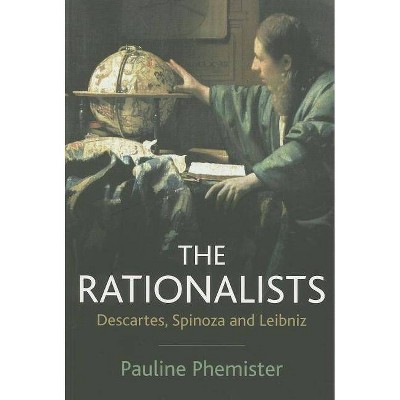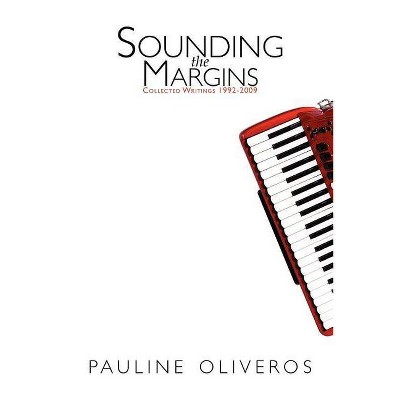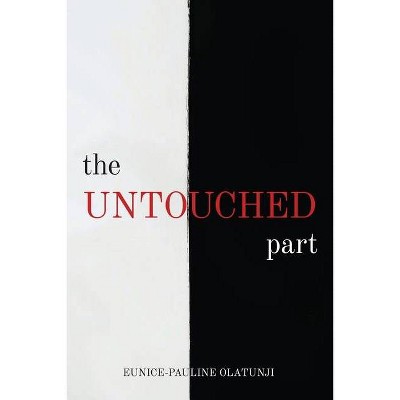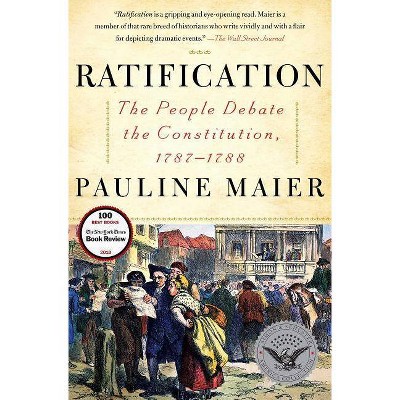The Rationalists - by Pauline Phemister (Paperback)

Similar Products
Products of same category from the store
AllProduct info
<p/><br></br><p><b> About the Book </b></p></br></br>Descartes, Spinoza and Leibniz stand out as the great 17th century rationalist philosophers who sought to construct a philosophical system in which theological and philosophical foundations serve to explain the physical, mental and moral universe. In her new book Pauline Phemister explores their contribution to the development of modern philosophy.<p/><br></br><p><b> Book Synopsis </b></p></br></br>Descartes, Spinoza and Leibniz stand out among their seventeenth-century contemporaries as the great rationalist philosophers. Each sought to construct a philosophical system in which theological and philosophical foundations serve to explain the physical, mental and moral universe. Through a careful analysis of their work, Pauline Phemister explores the rationalists seminal contribution to the development of modern philosophy.<br /> <br /> Broad terminological agreement and a shared appreciation of the role of reason in ethics do not mask the very significant disagreements that led to three distinctive philosophical systems: Cartesian dualism, Spinozan monism and Leibnizian pluralism. The book explores the nature of, and offers reasons for, these differences. Phemister contends that Spinoza and Leibniz developed their systems in part through engagements with and amendment of Cartesian philosophy, and critically analyses the arguments and contributions of all three philosophers. The clarity of the authors discussion of their key ideas including their views on knowledge, universal languages, the nature of substance and substances, bodies, the relation of mind and body, freedom, and the role of distinct perception and reason in morals will make this book the ideal introduction to rationalist philosophy.<p/><br></br><p><b> From the Back Cover </b></p></br></br>Descartes, Spinoza and Leibniz stand out among their seventeenth-century contemporaries as the great rationalist philosophers. Each sought to construct a philosophical system in which theological and philosophical foundations serve to explain the physical, mental and moral universe. Through a careful analysis of their work, Pauline Phemister explores the rationalists seminal contribution to the development of modern philosophy. <p>Broad terminological agreement and a shared appreciation of the role of reason in ethics do not mask the very significant disagreements that led to three distinctive philosophical systems: Cartesian dualism, Spinozan monism and Leibnizian pluralism. The book explores the nature of, and offers reasons for, these differences. Phemister contends that Spinoza and Leibniz developed their systems in part through engagements with and amendment of Cartesian philosophy, and critically analyses the arguments and contributions of all three philosophers. The clarity of the authors discussion of their key ideas including their views on knowledge, universal languages, the nature of substance and substances, bodies, the relation of mind and body, freedom, and the role of distinct perception and reason in morals will make this book the ideal introduction to rationalist philosophy.</p><p/><br></br><p><b> Review Quotes </b></p></br></br><br>Pauline Phemister's <i>The Rationalists</i> is a well-regulated account of three great seventeenth-century "system builders", replete with illuminating contrasts and comparisons.<br /> <p><b>Roger Woolhouse, <i>University of York</i></b><br /> </p> <p><br /> </p> <p>Pauline Phemister's comparative study of Descartes, Spinoza and Leibniz is an important contribution to the historiography of philosophy as well as a delight to read. The central issues of seventeenth-century metaphysics, including the nature of substance, ideas, God, mind and body, causality and freedom, are treated in depth and with exemplary lucidity. This is simply the best and most comprehensive survey of rationalism available.<br /> </p> <p><b>Catherine Wilson, <i>City University of New York</i></b></p><br><p/><br></br><p><b> About the Author </b></p></br></br><b>Pauline Phemister, </b> Lecturer in Philosophy, University of Edinburgh
Price History
Price Archive shows prices from various stores, lets you see history and find the cheapest. There is no actual sale on the website. For all support, inquiry and suggestion messages communication@pricearchive.us




















